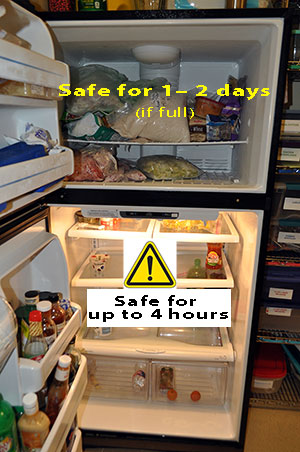Power Outage and Your Fridge or Freezer
Return to Heath and Nutrition Agent Articles
 When the power goes out, many people have questions about the food in their refrigerators and freezers. Knowing how to determine if food is safe and how to keep food safe will help minimize the potential loss of food and reduce the risk of food-borne illness.
When the power goes out, many people have questions about the food in their refrigerators and freezers. Knowing how to determine if food is safe and how to keep food safe will help minimize the potential loss of food and reduce the risk of food-borne illness.
Power outage
In the event of a power failure, keep the doors to refrigerators and freezers closed. This will help keep food cold longer.
- Freezer: Food in freezers can stay frozen or at least cold for 1 – 2 days, depending on how full it is and how often it is opened.
- Dry ice can be placed in a freezer on top of boards or heavy paper placed over food packages to keep temperatures below freezing.
- Allow 2.5 – 3 pounds of dry ice per cubic foot of space.
- More will be needed in an upright freezer because dry ice should be placed on each shelf.
- Dry ice can cause burns. Don’t handle it with bare hands.
- Refrigerator: Refrigerated food should be safe as long as the power is out for no longer than 4 hours.
What to do when the power is restored
Once the power is restored, you will need to evaluate the safety of the food.
- Freezer:
- If an appliance thermometer was kept in the freezer, read the temperature when the power comes back on.
- If the thermometer stored in the freezer reads 40º F or below, the food is safe and may be refrozen.
- If a thermometer has not been kept in the freezer, check each package of food to determine safety.
- Partially thawed frozen foods with ice crystals may be safely refrozen.
- Frozen foods that have thawed completely and warmed to temperatures above 40º F for less than 2 hours should be cooked or eaten immediately or discarded.
- After cooking, items can be refrozen. However, the texture will not be as good on items such as breaded seafood or fruits and vegetables.
- Breads can be refrozen as well as waffles and other breakfast items that are still at or below 40º F.
- Do not refreeze frozen dinners that have thawed.
- Refrigerator:
- Discard any perishable food (such as meat, poultry, fish, eggs or leftovers) that has been above 40º F for 2 hours.
- You can not rely on appearance or odor.
- Never taste food to determine safety.
- When in doubt, throw it out!
Plan ahead in case your freezer or refrigerator stops. Locate a source of dry ice. During seasons when power failures are frequent, set the freezer to run between -10°F and -20°F. The colder the food, the more slowly it thaws. Buy an appliance thermometer so you know what the temperature is at all times but especially when the power goes out!
Want more great food tips, recipes and nutrition info?
Sign up to receive In Good Health each month in your email inbox.